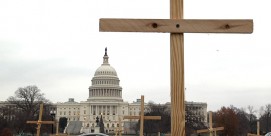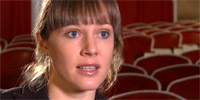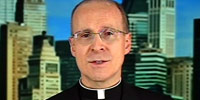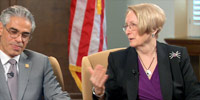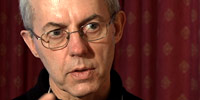In This Episode << SLIDE LEFT TO SEE ADDITIONAL SEGMENTS
Ambassador James Nicholson
Read more of Kim Lawton’s interview about the Vatican and foreign policy with Ambassador James Nicholson:
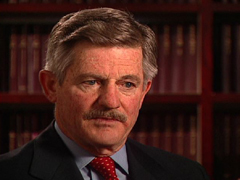 Q: What is the role of the US ambassador to the Vatican?
Q: What is the role of the US ambassador to the Vatican?
A: The role is the same as any other ambassador to a sovereign state — to represent our country, represent our president and the people, to communicate the values and goals of our country to that host country, and listen, be eyes and ears there and report back to our president, to our State Department, and to burnish the relationship between the countries. In the case of the Vatican, I always said I practiced moral diplomacy. I didn’t have to worry about military basing issues, balance and trade issues, current accounts. I could do what the fundamental purposes of US foreign policy are, and they’re iterated as such, which is to enhance human dignity, and I define that as — a life of dignity is when people have religious freedom, when they have legitimate aspirations for good health, sufficient food and education and hope, free of trafficking [and] human enslavement, free of AIDS, free of starvation. So those are the things that I worked on as our ambassador to the Holy See, and they were a very receptive, collaborative, bilateral partner, because that’s exactly what they stand for is the enhancement of the human condition, and, of course, in their case they would add, and the salvation of the immortal soul.
Q: It’s difficult for Americans to think of the Vatican as a state and not just a church, isn’t it?
A: It has been, historically. In fact, that was one of the difficulties in trying to get an ambassador confirmed to the Holy See, which was an effort that’s been going on for 200 years and finally was successful under Ronald Reagan in 1984 when he said to Senator [Richard] Lugar and others after witnessing the role that Pope John Paul II was playing in Poland with the Gdansk dock workers and so forth. He said, “That man really adds value to our goal in bringing down communism. I need an ambassador,” and finally they got an ambassador confirmed by the Senate.
Q: How does the Holy See function as a state?
A: It’s an interesting question. I mean, you have an organization which is the head of one of the biggest churches in the world, and they have a sovereign state, and you have a pope who’s the head of that church — the pope, the successor of Peter and the head of the sovereign state of the Holy See, and it functions in those two different capacities. We in the United States have a diplomatic relationship with that sovereign state, and it has diplomatic relations with 175 countries throughout the world, has had relations with many of them for centuries. It’s one of the most sophisticated diplomatic corps in the world, and in most countries where there is a Vatican ambassador, and they call them nuncios, that nuncio pro forma is the dean of the diplomatic corps.
Q: What are some of the contributions the Vatican makes on the world stage?
A: The Vatican and the Holy See have been in existence for 2000 years, so it’s an iterative process. But in the last hundred years the Vatican has become a very respected sovereign voice, that is, a voice in the world forum for ideas and public policy. Pope Paul VI was actually the first pope to travel out of the Vatican — came to the United States, went to other countries, spoke to the UN, and it’s interesting, though. I like to reflect on the anecdote when World War II was ending and President Roosevelt was meeting with Churchill and Stalin at Yalta, and they were dividing up Europe in a postwar context, and they were finished, and Churchill mused, he said, should we talk to the pope first? And Stalin was dismayed. He said, “The pope? How many divisions does the pope have?” And they told Pius XII that story later, and he said, “Tell him that he’ll see my divisions in heaven.” But the point of that is that there’s a growing relevance of the head of this body of 1.3 billion people universally spread throughout the world, and the pope today, I think it’s fair to say, has a very large, legitimate moral megaphone, and that’s what popes do. They speak as a voice for faith and reason in the furtherance of human dignity, you know, of freedom, of justice, of peace for people writ large, and that freedom includes religious freedom. They’re very committed to religious freedom, the right of people to live a dignified life and to worship as they care to or to not worship, but not be coerced by a state or prevented by a state from doing that. And these are the things that you’ll hear from Benedict XVI when he comes, when he speaks here to our president, when he speaks at the UN. He will talk as a voice of reason for humanity, for the human dignity of people, which they consider to be a natural right.
Q: Do people listen when the pope speaks and when he uses that kind of language?
A: Well, the pope will also say that we’re in an era of what he calls “the dictatorship of relativism,” and that indicates that there will be too many people, probably in his view and in mine, that won’t listen. But many will, because the pope has a growing pulpit throughout the world and the universality of involvement — popes in recent years have become very involved in the whole question of religious reconciliation. When I presented my credentials to Pope John Paul II, it was two days after 9/11 of 2001, and he said to me in that meeting that was almost entirely devoted to talking about events that happened 48 hours before, he said we must stop those who kill in the name of God. So this message of this pope, which would be to try to bring about peace and justice and dignity not through the use of arms but through peaceful reconciliation, dialogue, conferencing — I mean, popes are men of peace, and this one is no exception, and so you’ll hear a great deal of that theme from the pope, and I think, you know, he will be listened to universally because they have earned that stature. I mean, the funeral of his predecessor, which I attended with President Bush, President Clinton, and President Bush 41, was a testimony, I think, to the increased relevance of this voice for moral reason and truth.
Q: John Paul II really transformed that role, didn’t he?
A: Well, he did. He visited, I think, 130 countries, wrote many books, many encyclicals, was, fair to say, a peripatetic pope who grew up under that literal dictatorship of the Nazis and the communists and knew what it was like, because he lived that way, to not be able to exercise your freedom, a freedom of worship and travel and hope, and then played a role in bringing that down, and I think burnished the role of the papacy as a result, certainly in this country and certainly in the minds of the president and the Congress of this country, because they learned anew the relevance of a voice for moral reason, and it’s interesting. Senator [Daniel Patrick] Moynihan, the late Senator Moynihan, was once the UN ambassador, and I think it was John Paul II who came and at the time [there were] the nascent uprisings at the docks in Poland. I think it was about in 1982, and Moynihan noted that as the pope spoke he observed the representatives of the Soviet Union and the Soviet states, the Eastern states, and he said for the first time he saw an expression of fear in their faces and not boredom.
Q: This pope has a much different personality than his predecessor. How does it come across on the international stage?
A: Well, they’re two very different people. I knew both of them, knew Cardinal Ratzinger, now Pope Benedict XVI, and knew Pope John Paul II quite well, being our ambassador there for three and a half years. Benedict is more cerebral, no question, more professorial. If he wasn’t being pope he would probably be professor somewhere, which he, I think, loves to do — to teach, instruct. But, you know, their mission is the same. John Paul II really grew up in and operated in an environment of a literal dictatorship for decades, with the communists and the Nazis. This pope in his own words is being pope in the era of the dictatorship of relativism and seeing a real drop-off in church attendance in the Western world, you know, the postmodern effects of prosperity in Europe, countries like Ireland, where you don’t see a lot of people going to church anymore, the Czech Republic, and those are challenges. He’s accepted the challenge to try to re-evangelize Europe, to try to burnish Catholic identity and have people know more about their faith and to be more transparent and proud of their faith, and he recognizes the tension in the world between religions and is trying to be a voice for reconciliation, bringing Islam together, other religions. While he’s in the United States he’s going to meet with the leaders of … different religions for purposes of fostering dialogue and, you know, in an expression of reaching out and trying not to agree with each other necessarily but to understand each other and to realize that all of these religions are based on a fundamental admonition, which is to love one another.
Q: He did run into controversy with the world of Islam. His speech at Regensburg generated a lot of protest and controversy. How big a challenge are relations with the Islamic world?
A: It’s an interesting question, because if you analyze it closely, you know, the moderate Muslim world should be in great solidarity with the Catholic Church because they’re both trying to tamp down relativism, tamp down the effects of secularism, you know, spiritless, faithless lives, and the values that people are deprived [of] and the character-building that, they would tell you, goes with a life of faith and the development of that. But unfortunately that hasn’t blossomed, and so this pope is reaching out. He’s brought together what he calls the Catholic-Islam forum. I think they’re having a big meeting in November in Rome, recognizing that there is the potential for great solidarity there among the religions. The problem, of course it’s always the problem, are the extremes, and the extreme Muslim Islamic fundamentalists, terrorists, are the real problem because they wreak real danger to peoples lives and so that life of dignity that we’re seeking for people, because they have to live in legitimate fear.
Q: From your vantage point what are the particular gifts this pope brings to the international community?
A: He’s a brilliant man. He’s humble, he’s Christ-like, he’s committed to the truth and to the propagation of the Catholic Church, not just for what it means to Catholics but what it means to people writ large and its potential for humanitarian assistance and the uplifting of people, particularly people suffering in African nations of AIDS and starvation. He’s a very Christ-like person, and I think he’s being seen now as that. He’s also a person that, you know, will speak his mind, and sometimes in the world of 24/7 television and the great attention that popes now get he gets in trouble for that.
Q: What do you see as the biggest challenges on the world scene that the Holy See can influence?
A: The biggest challenge worldwide clearly is the threat from terrorism. It just wreaks havoc on a civil life, and it can be done by a very few people. As John Paul II used to say to me, these are stateless terrorists who are killing in the name of God, and they must be stopped, and that is a challenge for all of us. It’s a challenge for the moderate Muslims, the leaders of those countries. It’s a challenge certainly for us in our country because we’re seen by them as being infidels and legitimate targets of being killed by them. So the pope and the Church, unencumbered by other agenda and the luggage and baggage that, you know, that goes with that, [are] a very, very legitimate and potential force for the reconciliation of these points of view and want to play that role and, I think, have great potential for us in doing that.
Q: How controversial was the Iraq war, preemptive war, within the Holy See, and how much of an issue do you think it will be during this papal visit?
A: Well, it was very controversial. I presented my credentials to John Paul II two days after the events of 9/11, and at that meeting he said we must stop those who kill in the name of God, which was a real supportive imprimatur, if you will, of us going into Afghanistan and trying to eradicate the Taliban and disrupt their base. He saw Iraq differently, there was no question about that, and spoke in January of 2003, [and his] saying no to war set off a real series of missives on that subject and a real challenge for me as the interlocutor between the president and our government and him and his government. It also set off a very useful, I think, discourse and series of conferences and public dialogue about the morality of the just war doctrine, and if one reads that carefully, and it was written about in the fifth century by Saint Augustine and others, it says that the decision is, belongs legitimately to the leader of a country exercising his or her prudential judgment, recognizing that there are evil forces afoot in the world and innocent people have a right to be protected, and so the pope, while clearly against our invasion of Iraq, never said it was immoral, never then and never since, because he couldn’t, really. It would be in contravention of the catechism of the Catholic Church, which says that decision belongs to the legitimately selected leader of the state that decides that it must do that in the interests of protecting its people, which is exactly the position that President Bush took.
Q: Do you anticipate it will be an issue for Benedict when he meets with President Bush and addresses the UN?
A: Yes, indeed, I think that it will come up in his discussions with President Bush. He will cover it in his speech at the UN. The pope is a man of peace and wants to use peaceful means to resolve disputes between people and nation-states, and we support that endeavor and did. We were very multilateral in seeking resolutions at the UN before deciding to go into Iraq, and the president stated often that the last and least desirable resort in trying to exercise his constitutional duty to the people of the United States to protect them is to go to war and to send American men and women to war.
Q: What other examples demonstrate the power and the potential impact the papacy and the Holy See can have on international relations?
A: Well, they have profound impact. I mean, they’re in communion with 1.3 billion Catholics and have an influence through the multiplier of the media to many other people, Christian and non-Christian people, and popes in recent eras are listened to. They’re respected because the world is seeking this foundation of moral reason, and popes, they don’t have economic engines they have to feed, they don’t have armies, they don’t have land. The Vatican is only 106 acres; it’s the smallest nation-state in the world. But it is a huge moral, spiritual super power, and it’s, you know, it’s a breath of fresh air, I think, to many people beyond the Catholic world to see what a pope thinks or says about the different contentious issues that abound in our world, about Darfur, about life, about cloning, about biogenetics. I worked a great deal on the genetic modification of food, to try to increase the food production in Africa. The Vatican participated in that debate and lent moral weight to that, even though in Europe they’re against that. The pope never resolutely came out, you know, in an unequivocal way for that, but he has a great amount of moral authority today, fair to say.
To illustrate the grasp I think that Pope John Paul II had of the American scene: I remember one morning we took visiting dignitaries in and an American cardinal said to the pope, “How are you doing this morning, Holy Father?” And the pope was crouched over because his Parkinson’s was quite advanced, and he didn’t respond, and it was awkward, and finally he sort of painfully raised his head and looked up over the horizon and said, “I don’t know yet. I haven’t had a chance to read the American press.”

